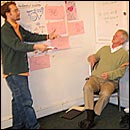Training for Change
JANUARY 13, 2007 Listen to this Story

- Training for Change
- View the Slideshow
Web Resources
- "I've been to the Mountaintop," delivered April 3, 1968 in Memphis, Tennessee
- "I Have a Dream," delivered August 28, 1963 at the Lincoln Memorial, Washington D.C.
- "Nobel Peace Prize Acceptance Speech," delivered December 10, 1964 in Oslo, Norway
- Training for Change
- 12th Annual Martin Luther King Day of Service
This year Philadelphia is hosting their 12th annual Martin Luther King Day of Service. It's the largest event honoring Dr. King in the country. People can sign up to do things like remove graffiti from public buildings and prepare meals for the poor. But George Lakey, the founder of Training for Change, and his colleagues, say service projects like these are not really true to King's legacy. We play some excerpts from Martin Luther King's speeches for four members of Training for Change, to find out how they believe King should be interpreted.
Training for Change Partial Glossary
allies (pair of allies): allies look out for each other in a workshop, give each other support, may even challenge each other to risk for growth. Sometimes called buddies.
class consciousness: individuals' awareness that they are part of a social class. In our workshops we encourage participants to identify themselves as working class (not "lower class," or "middle class"), to become aware of the negative messages sent by the culture about working class people, and to affirm the positive values that are encouraged in working class people.
conflict field: a way of pointing out that a conflict influences others besides those who primarily fighting with each other. It is sometimes the case that those who are, for example arguing, are actually acting out a deeper conflict present in the group or "field" and are representing that conflict while others who feel it remain silent.
cross-cultural training: the educational situation when the facilitator is of a different culture from some of the participants. Teaching outside one's culture takes extra awareness and sensitivity.
empowerment: the enhanced sense of power or capacity to change things that can come from learning, from personal/spiritual growth, from struggle, and from the deep experience of solidarity.
internalized oppression: the accumulated impact of negative messages and discrimination which reduces the self-esteem and personal power of individuals in an oppressed group. Internalized oppression is expressed not only in self-invalidation but is also expressed in negative attitudes toward others of the same group.
nonviolent struggle: a technique of action used in conflict situations to achieve social change goals or to defend economic and political achievements. Over 200 methods of nonviolent struggle have been used historically, in campaigns ranging from getting a stop sign on a street corner to overthrowing dictators. Also called "people power," nonviolent struggle has been used for thousands of years but only recently has it been accompanied by theory and strategy, and its use is now accelerating.
peeling the onion: when facilitators peel the onion they ask a series of questions that enable the participants to go to deeper levels of understanding. For example: "What has unemployment meant in your life, or for your friends and family? What difference might it make if we didn't have unemployment? What are some groups in society that would like a policy of full employment? What are some reasons for opposing full employment? What are some groups that might oppose such a policy? If everyone knew that we could have full employment, where would the majority stand? What would the government have to think about if it found that the majority of the people want a full employment policy?" and so on. See also "successive approximation."
safety: the sense that it's OK to risk and leave my comfort zone because I am not in danger of mental or physical injury. The facilitator increases safety for participants by building a container that rewards risk-taking.
third party nonviolent intervention: a method for shifting a destructive dimension of a conflict by, without taking sides, using your presence to assist the parties to respect each other. Useful in situations where the parties will not use mediation and one or both parties are being hurt. The immediate goal is not to gain agreement, but to reduce the violence. The best-known practitioner of this method is Peace Brigades International.
More Training for Change terms
-
- Music Bridge:
- Swings and Roundabouts
- Artist: Stomba
- CD: Tales from the Sitting Room (Fat Cat)







Comments
Comment | Refresh
Post a Comment: Please be civil, brief and relevant.
Email addresses are never displayed, but they are required to confirm your comments. All comments are moderated. Weekend America reserves the right to edit any comments on this site and to read them on the air if they are extra-interesting. Please read the Comment Guidelines before posting.
You must be 13 or over to submit information to American Public Media. The information entered into this form will not be used to send unsolicited email and will not be sold to a third party. For more information see Terms and Conditions and Privacy Policy.